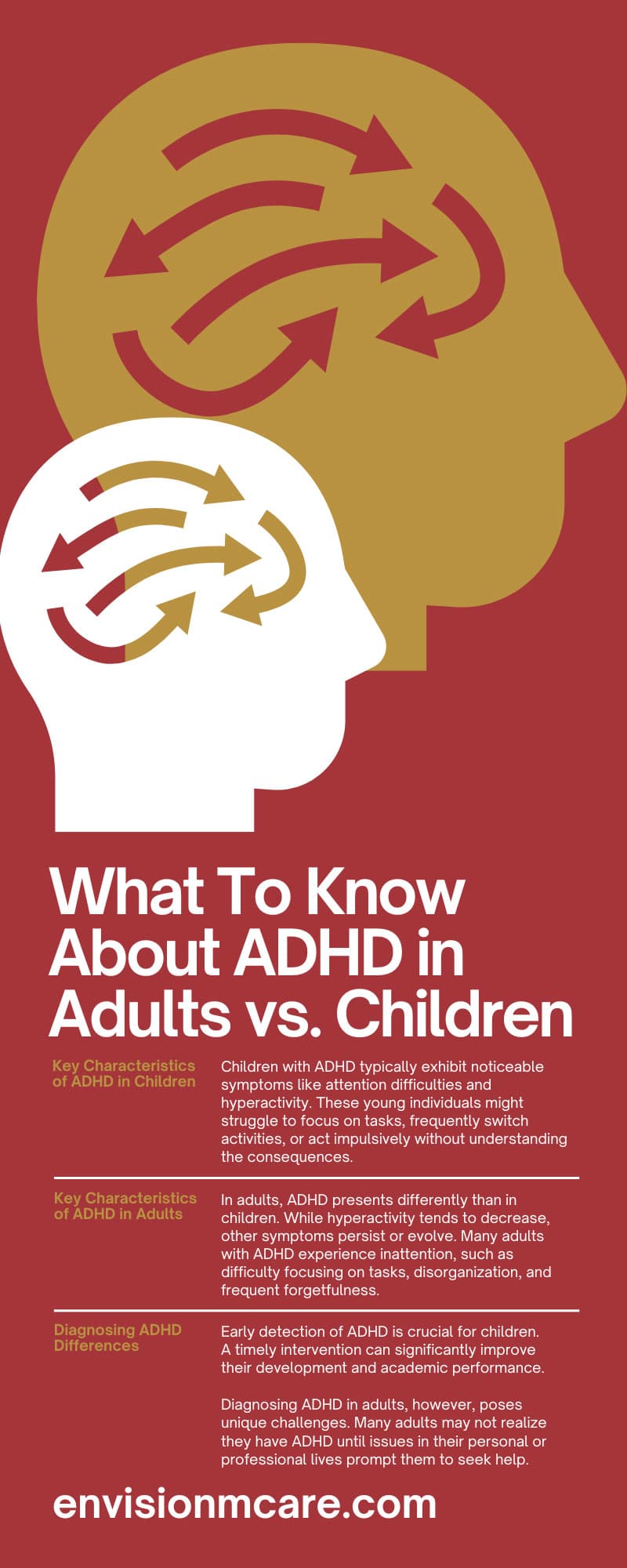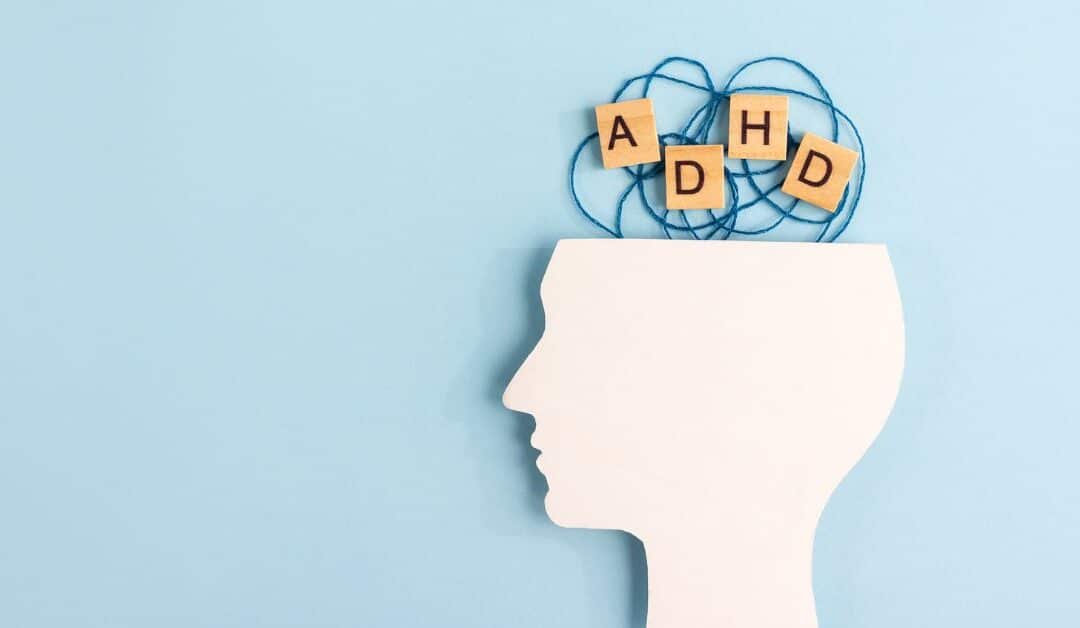Attention Deficit Hyperactivity Disorder (ADHD) affects people of all ages. While many assume it’s a childhood condition, it often persists into adulthood. In fact, some people don’t receive a diagnosis until they’re an adult.
Understanding the nuances between ADHD in adults and children is crucial for proper management and support. This guide explores these differences, helping adults with ADHD and parents gain a better grasp of this condition. Here’s what to know about ADHD in adults vs. children.
Introduction to ADHD
ADHD is a neurodevelopmental disorder that impacts focus, self-control, and other important abilities rooted in brain function. Though often associated with children, ADHD can continue into adulthood, manifesting differently as individuals age. Recognizing these differences and similarities is vital for managing symptoms and seeking appropriate treatments.
Key Characteristics of ADHD in Children
Children with ADHD typically exhibit noticeable symptoms like attention difficulties and hyperactivity. These young individuals might struggle to focus on tasks, frequently switch activities, or act impulsively without understanding the consequences.
Hyperactivity often translates to constant movement, such as fidgeting, squirming, or an inability to sit still. These behaviors can challenge their school performance and social interactions.
Diagnosing ADHD in children involves observing these behaviors over time and in various settings. Teachers, parents, and healthcare professionals play integral roles in recognizing these patterns. Once diagnosed, common treatments include medications, which help increase attention and decrease hyperactivity and impulsivity. Behavioral therapies, such as cognitive behavioral therapy (CBT), also support children by teaching them strategies to manage their symptoms.
Key Characteristics of ADHD in Adults
In adults, ADHD presents differently than in children. While hyperactivity tends to decrease, other symptoms persist or evolve. Many adults with ADHD experience inattention, such as difficulty focusing on tasks, disorganization, and frequent forgetfulness.
These issues can impact their professional lives, relationships, and overall quality of life. Adults may also struggle with time management, leading to missed deadlines or procrastination.
Adult ADHD often goes unnoticed because its symptoms can be mistaken for stress or other mental health conditions. It can affect daily life in subtle yet significant ways. Adults with ADHD may have difficulty maintaining employment or managing household responsibilities. Relationships might suffer due to misunderstandings or communication issues stemming from ADHD symptoms.
Diagnosing ADHD Differences
Early detection of ADHD is crucial for children. A timely intervention can significantly improve their development and academic performance. Pediatricians, psychologists, and educators collaborate to assess children’s behavior and determine whether ADHD is present. The process typically involves questionnaires, interviews, and observations across different settings.
Diagnosing ADHD in adults, however, poses unique challenges. Many adults may not realize they have ADHD until issues in their personal or professional lives prompt them to seek help. Self-advocacy becomes essential, as adults need to articulate their experiences and concerns to healthcare providers. Comprehensive evaluations involving medical histories, behavioral assessments, and possibly input from family members or colleagues can help confirm the diagnosis.
Treatment Approaches
Both children and adults benefit from a combination of medication and behavioral therapies to manage ADHD symptoms effectively. Medications for treating ADHD help regulate brain function and improve focus and impulse control. Working closely with healthcare providers to find the right prescriptions and dosages for each individual is essential. Psychiatrists will create a customized treatment for ADHD based on each individual.
Behavioral therapies, including CBT, play a pivotal role in treatment plans. These therapies teach coping strategies, organizational skills, and problem-solving techniques. For children, therapy often involves parents and teachers to ensure consistent support across environments. Adults might focus on developing routines and time-management skills to enhance productivity and reduce stress.
Coping Strategies and Support
Managing ADHD symptoms requires practical strategies and support systems tailored to individual needs. Creating structured routines at home and school helps provide stability and predictability for children. Visual aids, such as charts and schedules, can make it easier for children to understand and follow daily tasks. Positive reinforcement and clear, consistent communication between parents and teachers are essential in supporting children with ADHD.
Adults with ADHD benefit from similar strategies, albeit adapted for their unique challenges. Breaking tasks into smaller, manageable steps can make them less overwhelming. Using planners, apps, and reminders can help you stay organized and on track. Finding a support group or therapist specializing in adult ADHD can provide valuable insight, encouragement, and accountability.
Support groups offer a sense of community and understanding for both children and adults with ADHD. These groups provide opportunities to share experiences, exchange tips, and receive emotional support. In-person or online support groups can make a significant difference in managing ADHD’s impact on daily life.
Overcoming Stigma and Seeking Help for ADHD
One of the biggest hurdles for individuals with ADHD is overcoming the stigma associated with the condition. Misconceptions and stereotypes can lead to judgment and misunderstanding from others. Addressing these misconceptions, educating people about ADHD’s reality, and fostering empathy and support is vital.
Seeking professional advice is crucial for anyone suspecting they or their child may have ADHD. A formal diagnosis will open doors to effective treatment and support. Encouragement from family, friends, and healthcare providers plays a pivotal role in this process, helping individuals feel confident in seeking the help they need.
Helpful Resources
Finding the right resources to support you or your loved one in managing ADHD is crucial to achieving a balanced and fulfilling life. Numerous organizations, professionals, and online platforms can provide guidance, treatment, and support to navigate the complexities of ADHD.
Professional Organizations
- ADHD Foundation: A leading non-profit organization offering extensive information, advocacy, and resources for individuals with ADHD.
- CHADD (Children and Adults with Attention-Deficit/Hyperactivity Disorder): This organization provides support, education, and advocacy for individuals with ADHD. They offer various resources, including local support group finders and educational webinars.
- American Psychological Association (APA): The APA website provides a directory of licensed psychologists specializing in ADHD, offering both assessment and treatment services.
Healthcare Providers
- Pediatricians and primary care physicians: These professionals can be the first point of contact for concerns about ADHD, offering initial screenings and referrals to specialists.
- Psychiatrists and psychologists: Specializing in ADHD, these mental health professionals can provide comprehensive diagnostic evaluations and individualized treatment plans.
- Licensed therapists and counselors: Behavioral therapists skilled in ADHD can assist in implementing coping strategies and addressing any related emotional or social challenges.
By leveraging these resources, people with ADHD and their families can find the support and tools needed to manage symptoms effectively and lead enriched lives. Seeking help is a brave and essential step in the journey toward wellness.
ADHD affects children and adults in different ways. Recognizing these differences is essential for effective management and support. Understanding ADHD’s characteristics, diagnostic processes, and treatment options will help individuals and families navigate its challenges. Support systems, whether through therapy, support groups, or community resources, play a critical role in managing ADHD and improving quality of life.


